Hassani S. Mathematical Physics: A Modern Introduction to Its Foundations
Подождите немного. Документ загружается.

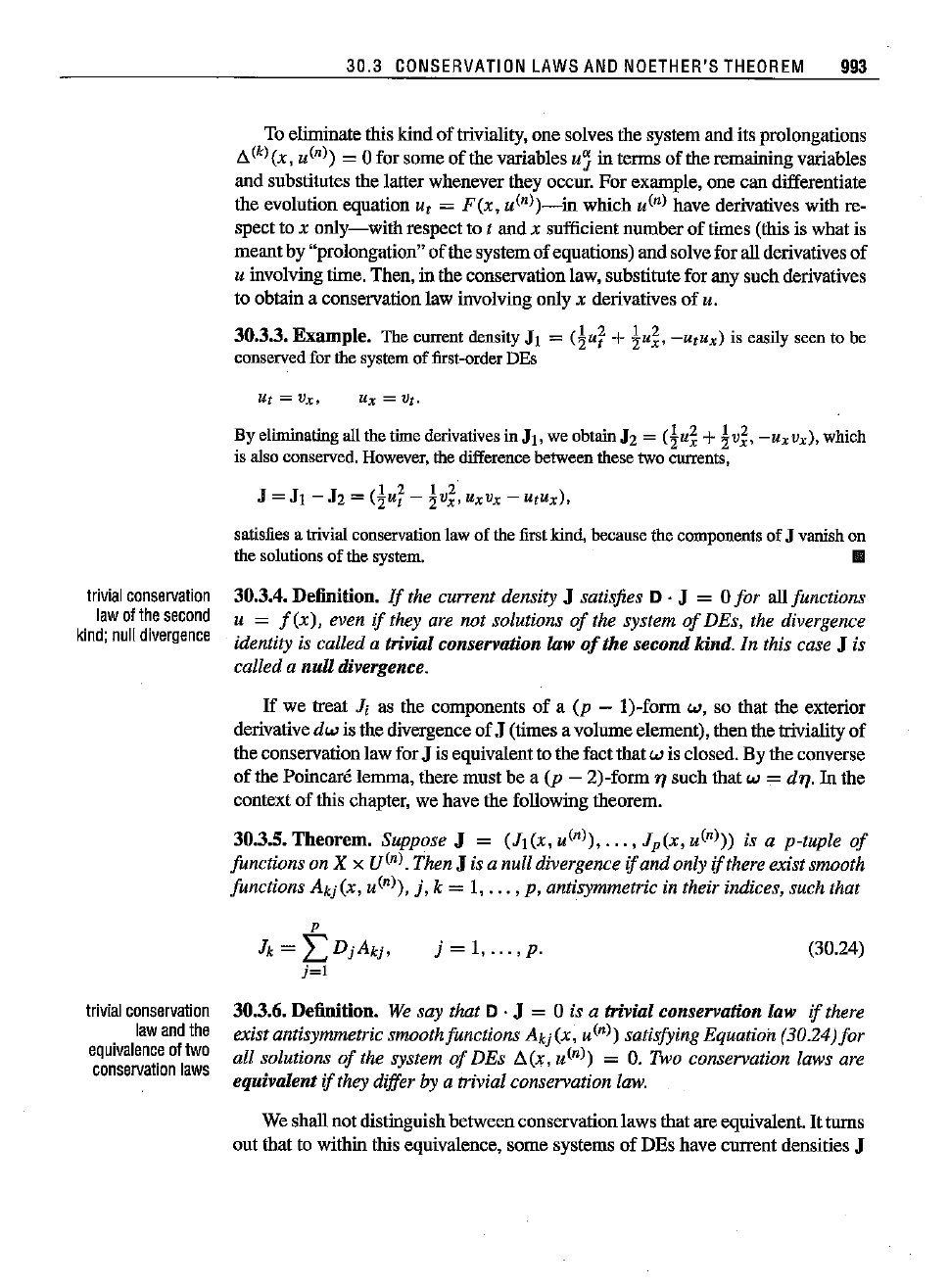
30.3
CONSERVATION
LAWS
AND
NOETHER'S
THEOREM
993
To eliminate this
kind
of
triviality. one solves the system
and
its prolongations
t. (k)(x.
u(n»
= 0 for some
of
the variables
u~
in terms
of
the remaining vatiables
and
snbstitutes the latter whenever they occur.
For
example. one can differentiate
the evolution equation u, =
Ftx,
u(n»_in
which u(n) have derivatives with re-
spectto
x
only-with
respect to t
and
x sufficient number
of
times (this is what is
meantby "prolongation"
of
the system
of
equations)
and
solvefor all derivatives
of
u involving time. Then. in the conservation law. substitute for any suchderivatives
to obtain a conservation law involving only
x derivatives
of
u.
30.3.3.
Example.
The currentdensity J1 =
(!uF
+
!u~.
-u,ux)
is easily seen to be
conservedfor the systemof first-orderDEs
Ut
=
ve,
Ux =
Vt.
trivial
conservation
law
of
the
second
kind;
null
divergence
By eliminatingall the timederivatives in Jj ,we obtainJ2 =
(!ui
+
!v;.
-uxvx),
which
is also conserved. However, the difference between these two currents,
J = Jr - J2 =
(!u;
-
!v;,
UxVx
-
UtUx),
satisfiesa trivialconservation law of the firstkind,because the componentsof J vanishon
the solutions of the system. II
30.3.4. Definition.
If
the current density J satisfies D . J = 0 for all functions
u
=
f(x),
even if they are not solutions
of
the system
of
DEs, the divergence
identity is called a trivial conservation
Taw
of
the secondkind. In this case J is
called a
null
divergence.
If
we treat J; as the components
of
a
(p
-
I)-form
w. so that the exterior
derivative
dw
is the divergence
of
J (times a volumeelement). thenthe triviality
of
the conservationlaw for J is equivalentto the factthatw is closed. By the converse
of
the Poincare lemma. there
must
be a
(p
-
2)-form
1} such that w = dn. In the
context
of
this chapter. we have the following theorem.
30.3.5.
Theorem.
Suppose J = (1J(x.
u(n»
•...•
Jp(x. u(n») is a p-tuple
of
functions on X x u».Then Jis a null divergence if
and
only ifthere exist smooth
functions Akj(X. u(n»,
i. k = I
•...•
p, antisymmetric in their indices, such that
p
h =
LDjAkj.
)=1
j = I
....
•p.
(30.24)
trivial
conservation
law
and
the
equivalence
oftwo
conservation
laws
30.3.6. Definition. We say that D . J = 0 is a trivial conservation law if there
exist antisymmetric smooth functions Akj
(x,
u
(n»
satisfying Equation (30.24) for
all solutions
of
the system
of
DEs
t.(x.
u(n»
=
O.
Two conservation laws are
equivalent
ifthey differ by a trivial conservation law.
We shallnot distinguish betweenconservationlaws that are equivalent.
It
turns
out that to within this equivalence. some systems
of
DEs
have current densities J
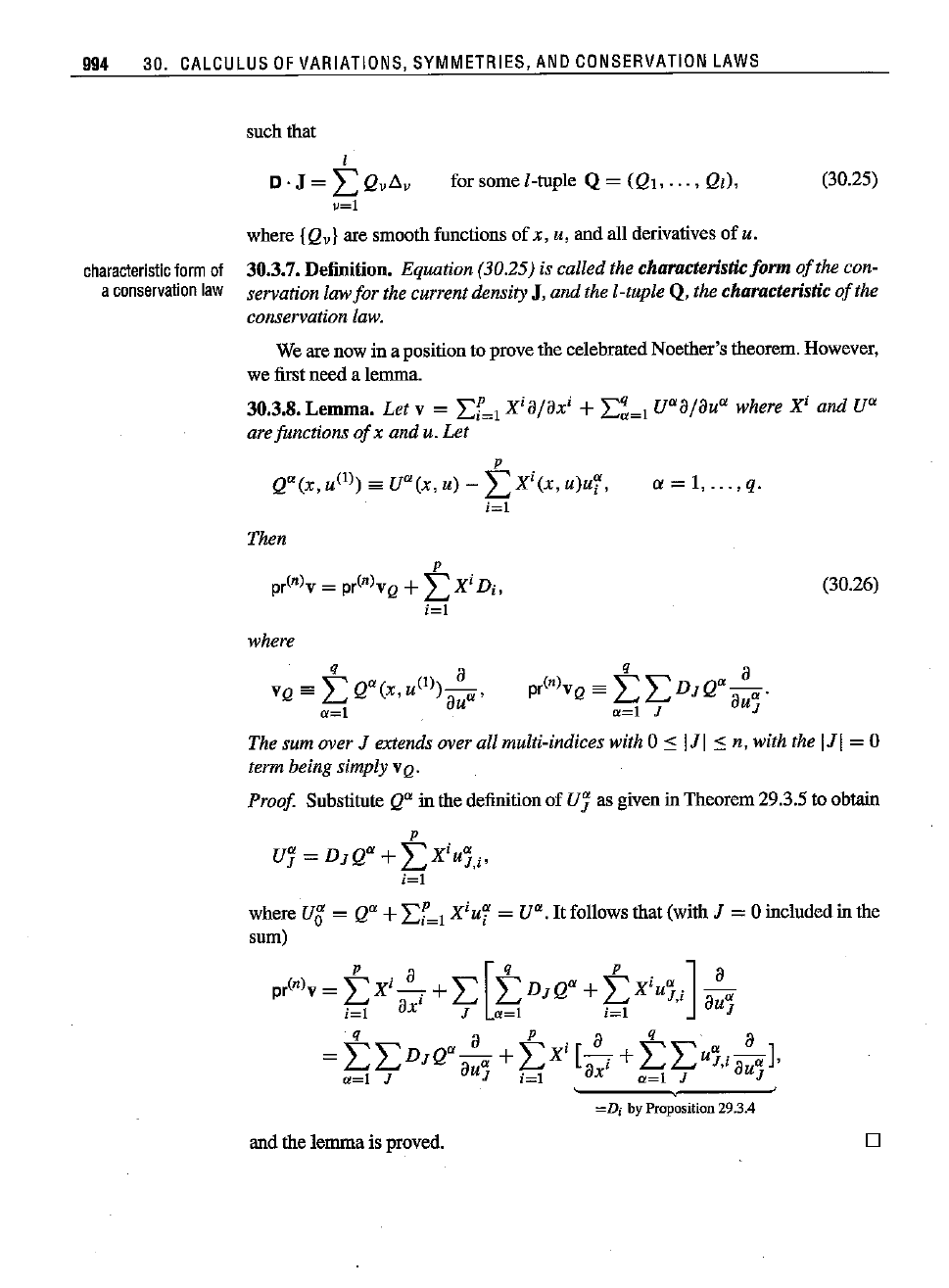
994 30.
CALCULUS
OF
VARIATIONS,
SYMMETRIES,
AND
CONSERVATION
LAWS
such that
for some
I-tuple Q=
(Qt,
...
,
Q/),
(30.25)
where {Qv} are smooth functions
of
x, u,
and
all derivatives
of
u.
characteristic
form
of 30.3.7. Definition. Equation (30.25) is calledthe characteristicfiarm
of
the con-
a
conservation
law
servation lawfor the current density J,
and
the l-tuple Q,the characteristic
of
the
conservation law.
Wearenowinapositionto
prove
the
celebrated
Noether's
theorem.
However,
we first
need
a lemma.
30.3.8.
Lemma.
Let v =
L1=1
Xiajax
i
+
L~~l
U"ajau"
where Xi and U"
arefunctions
of
x and u. Let
p
Q"(x,
u(l)) sa
U"(x,
u) -
LXi(x,
u)ur,
.
i=1
Then
p
pr(n)v = pr(n)vQ +
LXi
o..
i=1
where
a =1,
...
.q,
(30.26)
The sum over J extends over all multi-indices with 0 s IJIs n, with the IJI= 0
term being simply vQ.
Proof
Substitute Q" in the definition
of
U'J as given in Theorem 29.3.5 to obtain
p
U'J =
DJQ"
+
LXiuj,/,
;=1
where
ug
= Q" +
L1~1
Xi
ur
= U".
It
follows
that
(with J = 0 included in the
snm)
=Dj by
Proposition
29.3.4
and the
lemma
is proved.
D
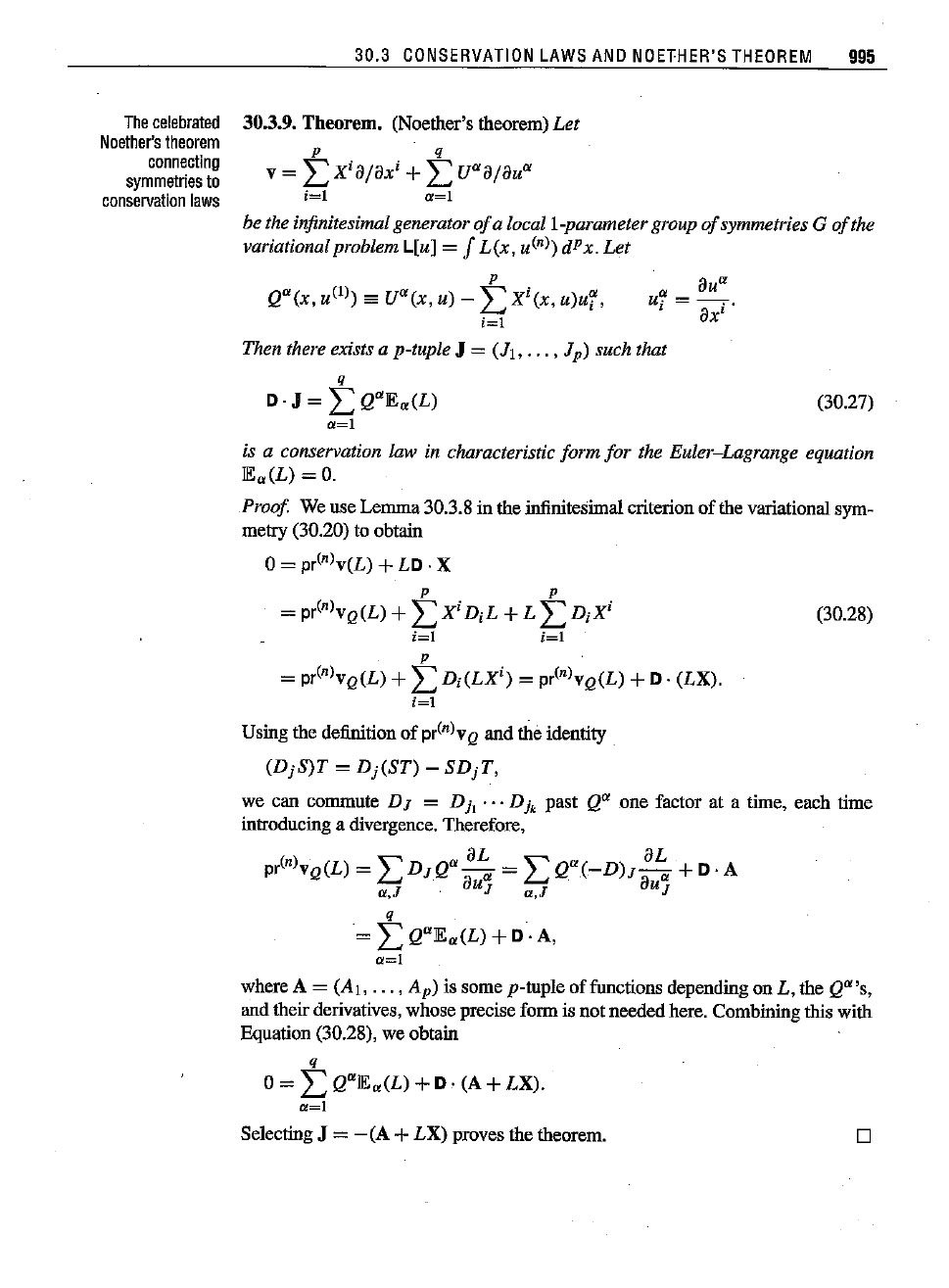
The
celebrated
Noether's
theorem
connecting
symmetries
to
conservation
laws
30.3
CONSERVATION
LAWS
ANO
NOETHER'S
THEOREM
995
30.3.9. Theorem. (Noether's theorem) Let
p q
v=
LX'8/8x'
+
Lu
u8/8u
u
i=1
a=l
be the infinitesimalgenerator
of
a local s-parameter group
of
symmetries G
of
the
variationalproblem L[u] = J
L(x,
u(n»
dPx. Let
P
QU(x, u(l»
'"
UU(x, u) - L
X'(x,
u)uf,
i=1
(30.27)
(30.28)
Then there exists a p-tuple J = (11,
...
, J
p
) such that
q
D·
J = L QUlEu(L)
a=l
is a conservation law in characteristic form for the Euler-Lagrange equation
lEu(L) =
O.
Proof We use Lemma30.3.8 in the infinitesimal criterion of the variational sym-
metry (30.20) to obtain
0=
pr(n)v(L)+LD . X
p p
= pr(n)vQ(L)+
LXiD,L+LLDiXi
;=1
i=1
p
= pr(n)vQ(L)+L
Di(LX')
= pr(n)vQ(L)+
D·
(LX).
i=1
Using the definition of pr(n)vQ and the identity
(DjS)T
=
Dj(ST)
-
SDjT,
we can commute DJ = D
iI
...
Dik past
QU
one
factor at a time, each time
introducing a divergence. Therefore,
(n)
'"
U 8L
'"
U 8L
pr
vQ(L)=L.JDJQ
----a=L.JQ
(-D)J----a+
D
.
A
a,J
au]
a,J
au]
q
= L QUlEu(L)+
D·
A,
01=1
where A =
(AI,
...
, A
p
) is some p-tnple of functions depending on
L,
the QU's,
and their derivatives, whose precise form is not needed here. Combiningthis with
Equation (30.28), we obtain
q
0=
L QUlEu(L)+
D·
(A +
LX).
a=l
Selecting J =
-(A
+
LX)
proves the theorem.
D
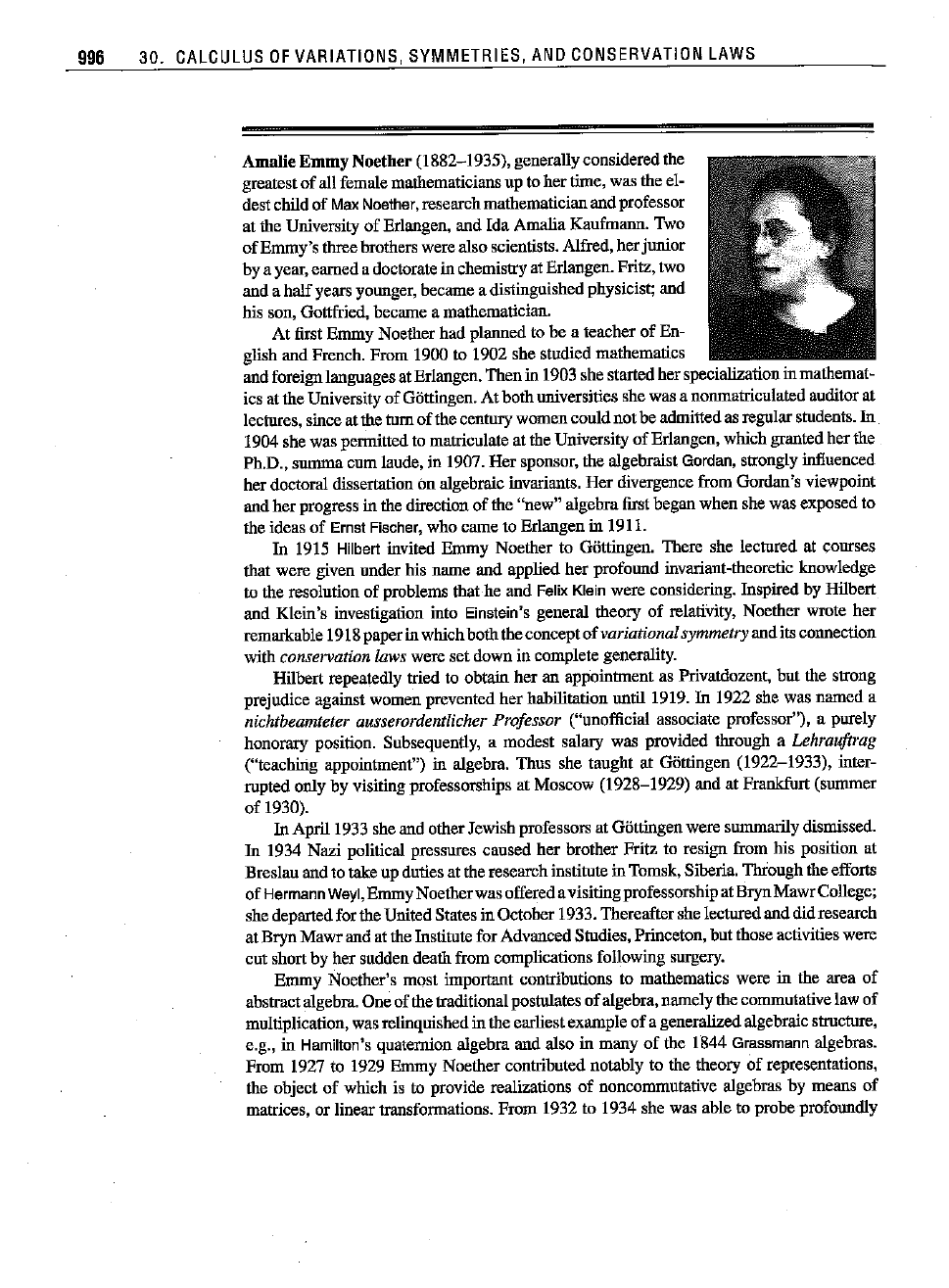
996 30.
CALCULUS
OF
VARIATIONS, SYMMETRIES,
AND
CONSERVATION
LAWS
Amalie
Emmy
Noether
(1882-1935), generallyconsideredthe
greatest
of
all female mathematiciansup to
her
time, was the el-
dest
child
of
MaxNoether, researchmathematician
and
professor
at the University
of
Erlangen, and Ida Amalia Kaufmann. Two
of
Em
my's
threebrothers
were
also
scientists. Alfred,
her
junior
by a year,
earned
a doctoratein chemistry at Erlangen. Fritz, two
and a halfyears younger, became a distinguished physicist; and
his son, Gottfried, became a mathematician.
At first Emmy Noether had planned to be a teacber
of
En-
glish and French. From 1900 to 1902 she studied mathematics
andforeignlanguagesatErlangen.Thenin 1903shestartedherspecializationinmathemat-
ics at
the
University
of
Gottingen.
At
both
universities she was a nonmatriculated auditorat
lectures, sinceat the
tum
of
the century
women
could
not
be admittedas regular students.
In
1904 she was permitted to matriculate at the University
of
Erlangen, which granted her the
Ph.D., summa cum laude, in 1907.
Her
sponsor, the algebraist Gordan, strongly influenced
her doctoral dissertation on algebraic invariants.
Her
divergence from Gordan's viewpoint
and
her
progress in the direction
of
the "new" algebra first began when she was exposed to
the ideas
of
Ernst Fischer, who came to Erlangen in 1911.
In 1915
Hilbert
invited Emmy Noether to Gottingen. There she lectured at courses
that were given under his name and applied her profound invariant-theoretic knowledge
to the resolution of problems
that
he and
Felix
Klein
were considering. Inspired by Hilbert
and Klein's investigation into Einstein's general theory
of
relativity, Noether wrote her
remarkable 1918paperin whichboththe concept
of
variationalsymmetryand its connection
with
conservation laws were set down in complete generality.
Hilbert repeatedly tried to obtain
her
an appointment as Privatdozent, but the strong
prejudice against women prevented her habilitation until 1919. In 1922 she was named a
nichtbeamteter ausserordentlicher Professor ("unofficial associate professor"), a purely
honorary position. Subsequently, a modest salary was provided through a
Lehrauftrag
(vreaching appointment") in algebra. Thns she taught at Giittingen (1922-1933), inter-
rupted only by visiting professorships at Moscow (1928-1929) and at Frankfurt (summer
of
1930).
In April 1933 she and otherJewish professors at Gottingenwere summarily dismissed.
In 1934 Nazi political pressures caused her brother Fritz to resign from his position at
Breslau and to take up duties at the research institute
in Tomsk, Siberia. Throughthe efforts
of
Hermann
Weyl,
Emmy Noetherwasoffered avisitingprofessorshipat BrynMawrCollege;
she departedfor the UnitedStates in October 1933. Thereaftershe lectured and did research
at Bryn
Mawr
and at the Institute for Advanced Studies, Princeton, but those activities were
cut short by her sudden death from complications following surgery.
Emmy Noether's most important contributions to mathematics were in the area
of
abstractalgebra. One of the traditionalpostulates
of
algebra, namely the commutative law of
multiplication, was relinquished
in the earliestexample
of
a generalizedalgebraic structure,
e.g.,
in Hamilton's quatemion algebra and also in many
of
the 1844 Grassmann algebras.
From 1927 to 1929
Emmy Noether contributed notably to the theory
of
representations,
the object
of
which is to provide realizations
of
noncommutative algebras by means
of
matrices, or linear transformations.
From
1932 to 1934 she was able to probe profoundly
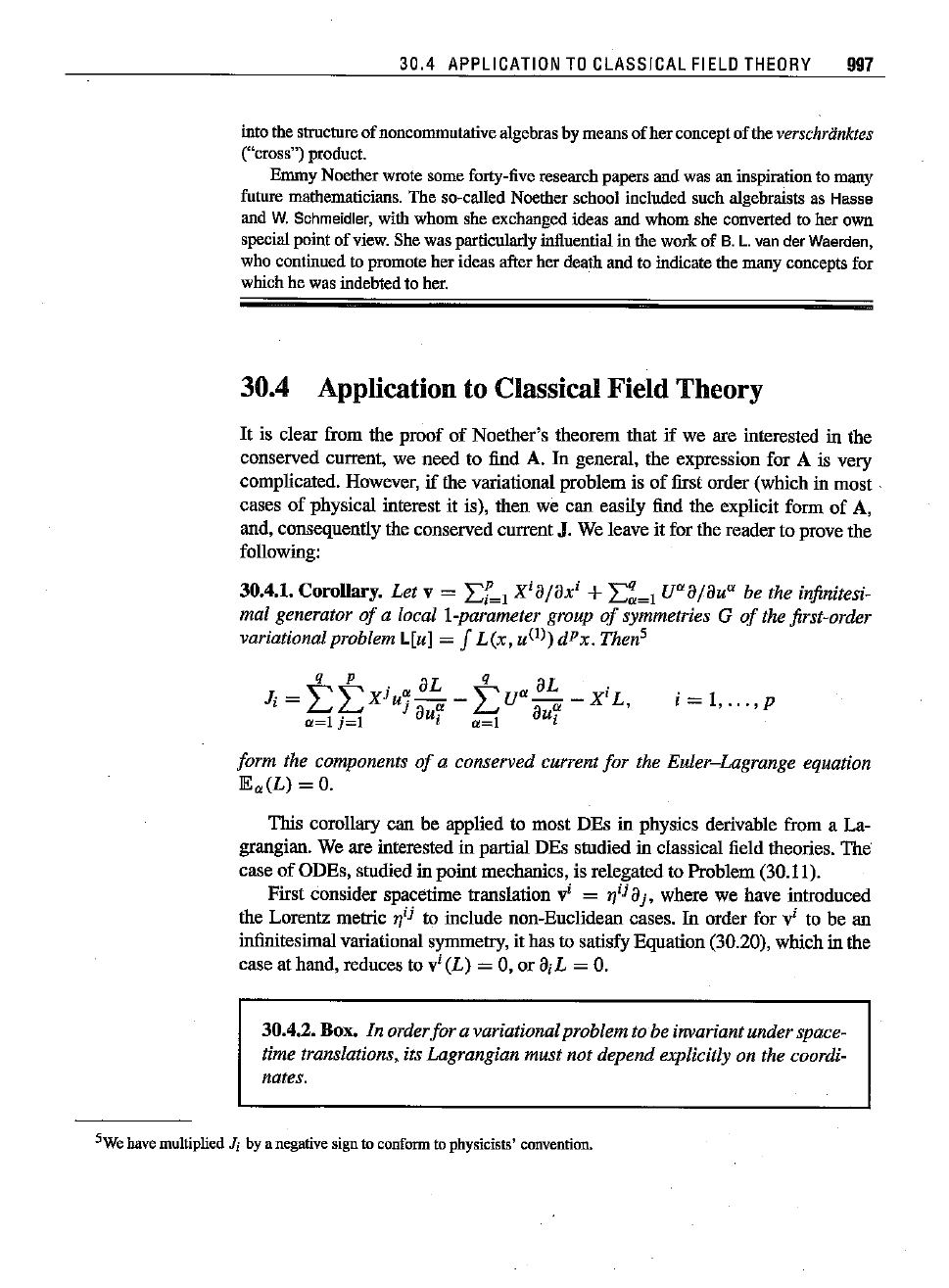
30.4 APPLICATION
TO
CLASSICAL
FIELO
THEORY
997
intothe
structure
of
noncommutative
algebras
by
means
of
her
concept
of
the verschriinktes
("cross")
product.
Emmy
Noether
wrote
some
forty-five
research
papers
andwasan
inspiration
tomany
future
mathematicians.
Theso-called
Noether
school
included
such
algebraists
as Hasse
and
W.
Schmeidler,
with
whomshe exchanged ideasandwhomshe
converted
to herown
special
point
ofview.Shewas
particularly
influential
inthe
work
of
B.
L.
van
der
Waerden,
who
continued
to
promote
herideas
after
her
death
andto
indicate
the
many
concepts
for
whichhewas
indebted
to
her.
30.4 Applicationto Classical Field Theory
It
is clear from the proof of Noether's theorem that
if
we are interested in the
conserved current, we need to find A. In general, the expression for A is very
complicated. However,
if
the variational problem is
of
first order (which in most .
cases
of
physical interest it is), then we can easily find the explicit form of A,
and, consequently the conserved current J. We leave it for the reader to prove the
following:
30.4.1. Corollary. Let v =
Lr~l
xia/ax
i
+
L~~l
uaa/au
a
be the infinitesi-
mal generator
of
a local I-parameter group
of
symmetries G
of
the first-order
variationalproblem L[u]
= J
L(x,
u(l) dt'x, Then
5
i = 1,
..
o,p
form the components
of
a conserved current for the Euler-Lagrange equation
IEa(L)
=
O.
This corollary can be applied to most DEs in physics detivable from a La-
grangian. We are interested in partial DEs stodied in classical field theories.
The
case
of
ODEs, stodied in pointmechanics, is relegated to Problem (30.11).
Fitst consider spacetime translation vi
=
~ij
a
j,
where we have introduced
the Lorentz mettle
~ij
to include non-Euclidean cases. 10 order for v' to be an
infinitesimal vatiational symmetry, it has to satisfy Equation (30.20), which in the
case at hand, reduces to vi
(L) =0, or aiL =
O.
30.4.2. Box. In orderfor a variationalproblem to be invariant under space-
time translations, its Lagrangian must not depend explicitly on the coordi-
nates.
5Wehave
multiplied
Jj by anegativesignto
conform
tophysicists'
convention.
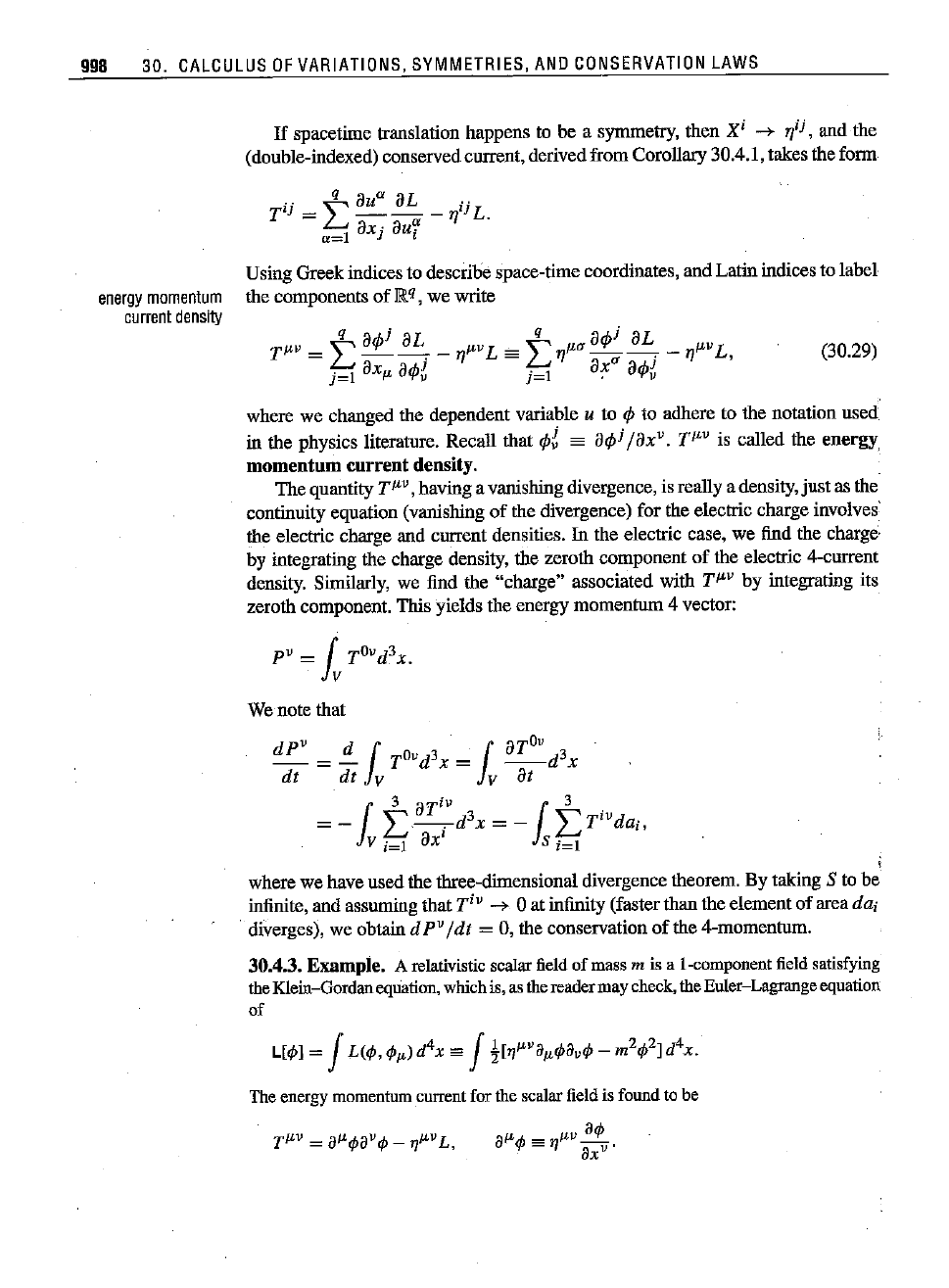
998 30,
CALCULUS
OF
VARIATIONS, SYMMETRIES,
AND
CONSERVATION
LAWS
If
spacetime translation happens to be a symmetry, then Xi
-+
ryi},
and the
(double-indexed) conservedcurrent,derivedfrom Corollary 30.4.1, takes the form
,.
-f.
au
a
aL
..
T'J =
L.
----
-
ry'J
L
u=l
axj auf .
(30.29)
energy
momentum
current
density
Using Greek indices to describe space-time coordinates, and Latinindices to
label
the components
of
llt
q
, we write
q'
q'
TfL
V
= L
at/>J
aL
_
ryfLV
L sa L
ryfL
rr
at/>~
aL
_
ryfL
V
L,
'-1
ax"
a",J
'-I
ax
at/>J
J-
r o/v
J_.
v
where we changed the dependent variable u to
t/>
to adhere to the notation used
in the physics literature. Recall that
t/>t
es
at/>j
lax
v
.
TfL
V
is called the energy,
momentum current density.
The
quantity T
fLV
,having a vanishingdivergence, is really a density,
just
as the
continuity equation (vanishing
of
the divergence) for the electric charge involves
the electric charge and current densities.
In
the electric case, we find the charge'
by integrating the charge density, the zeroth component
of
the electric 4-current
density. Similarly, we find the "charge" associated with
TfL
V
by integrating its
zeroth component. This yields the energy momentum 4 vector:
pv =
Iv
TO
vd3
x.
We note that
,
where we have used the three-dimensional divergence theorem. By taking S to be
infinite, and assuming that
T
iv
-+
0 at infinity (fasterthan the element
of
area da,
diverges), we obtain d P"
[dt
= 0, the conservation
of
the 4-momentum.
30.4.3. Example. A relativistic scalarfieldof mass m is a l-component fieldsatisfying
the
Klein-Gordan
equation,
whichis,asthe
reader
may
check,
the
Euler-Lagrange
equation
of
Theenergy
momentum
current
forthe
scalar
fieldis foundtobe
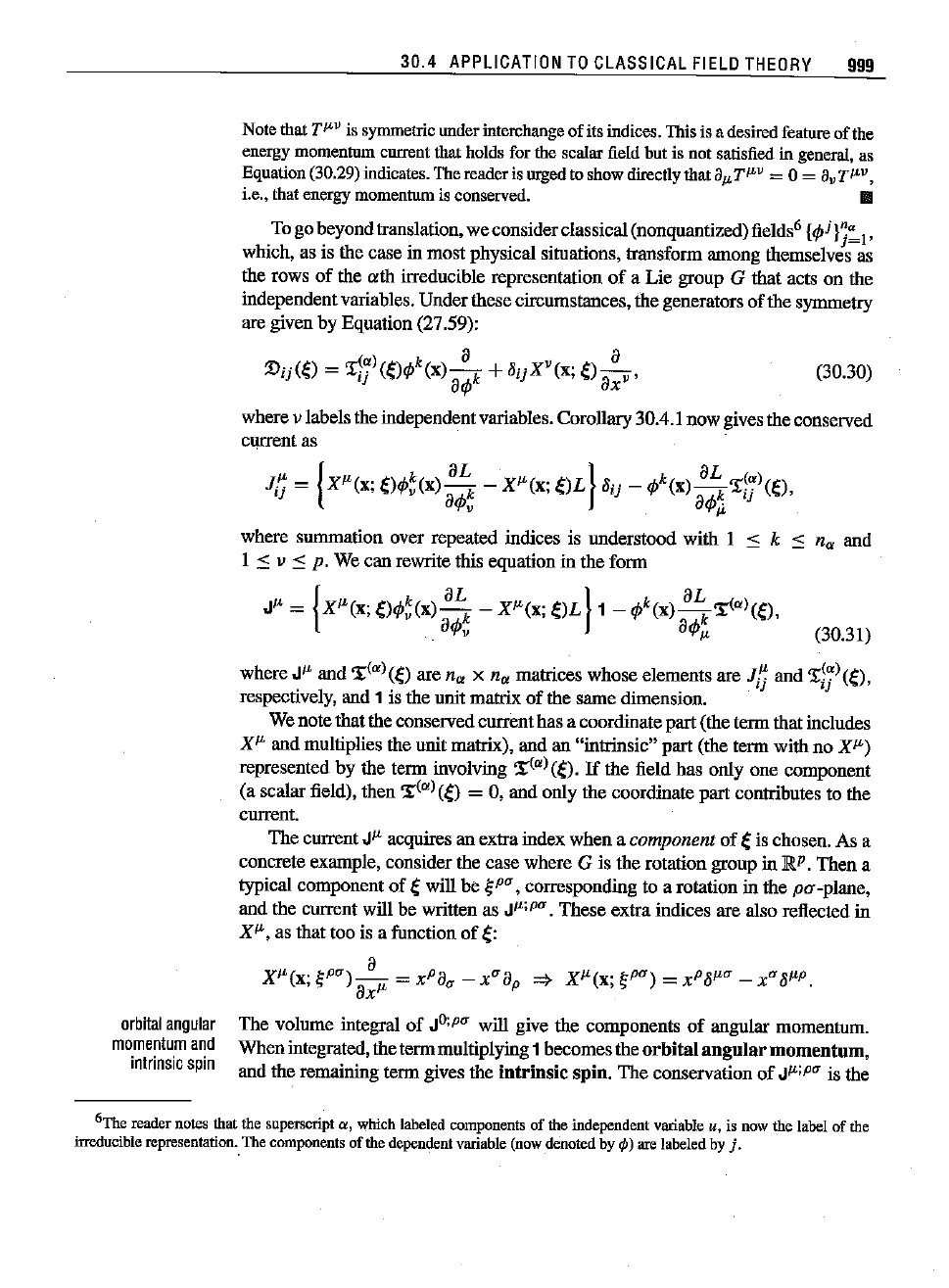
(30.31)
orbital
angular
momentum
and
intrinsic
spin
30.4 APPLICATION
TO
CLASSICAL FIELD
THEORY
999
Note
that
Tf.L
V
is
symmetric
under
interchange
ofitsindices. Thisisa
desired
feature
ofthe
energy
momentum
current
that
holdsforthe
scalar
fieldbutis not
satisfied
in
general,
as
Equation
(30.29)
indicates. Thereaderisurgedtoshowdirectlythat
a"T"v
= 0 =
avT"v,
i.e., thatenergy momentumis conserved.
III
Togo beyondtranslation, we considerclassical(nonquantized)fields
6
{t/Jj}
j:::l'
which, as is the case in most physical situations, transform among themselves as
the rows of the
ath
irreducible representation
of
a Lie group G that acts on the
independentvariables. Underthese circumstances, the generators of the symmetry
are given by Equation (27.59):
(a) k a v a
:Dij(l;) =
'r
ij
(I;)t/J
(X)-k
+
8ijX
(x;
I;)-a
v'
(30.30)
at/J
x
where vlabels the independentvariables. Corollary 30.4.1 now gives the conserved
current
as
J!j
=
{X"
(x; I;)t/Je(x)
aL
k
-
X"(x;
I;)L}
8ij -
t/Jk(x)
a~
~j)(I;),
at/J
v
at/J~
where summation over repeated indices is understood with I
:s:
k
:s:
n
a
and
I
:s:
v
:s:
p. We can rewrite this equation in the form
J"
= {X"(X; I;)t/Jk(x)
aL
_
X"(x;
I;)L}
1 _
t/Jk(x)
aL
~(a)(I;),
v
at/Je
at/J~
where
J"
and
~(a)(I;)
are n« x n
a
matrices whose elements are
J!j
and
'rij)
(1;),
respectively, and 1 is the unit matrix
of
the same dimension.
Wenote that the conserved currenthas a coordinatepart (the
term
that includes
X"
and multiplies the unit matrix), and an "intrinsic" part (the term with no
X")
represented by the term involving
~(a)
(1;).
If
the field has only one component
(a scalar field), then
~(a)
(1;)
= 0, and only the coordinate part contributes to the
current.
The current
J"
acqnires an extra index when a component of I; is chosen. As a
concrete example, consider the case where G is the rotation group in
RP.
Then a
typical component of I; will be
~
po
, corresponding to a rotation in the
pa
-plane,
and the current will be written as
J";pu.
These extra indices are also reflected in
X",as that too is a function
of
1;:
a
X"(x;
~PU)
ax"
=x
P
au -
XU
a
p
=}
X" (x;
~pU)
=
x"
8"u -
XU
8"p.
The volume integral of
JO;pu
will give the components
of
angular momentum.
Whenintegrated,the term multiplying1becomesthe
orbital
angular
momentum,
and the remaining term gives the intrinsic spin. The conservation
of
J";pu
is the
6The
reader
notesthatthe
superscript
a, whichlabeled
components
of the
independent
variable
u, is nowthe labelof the
irreducible
representation.,
The
components
of the
dependent
variable
(now
denoted
by¢) arelabeledbyi-
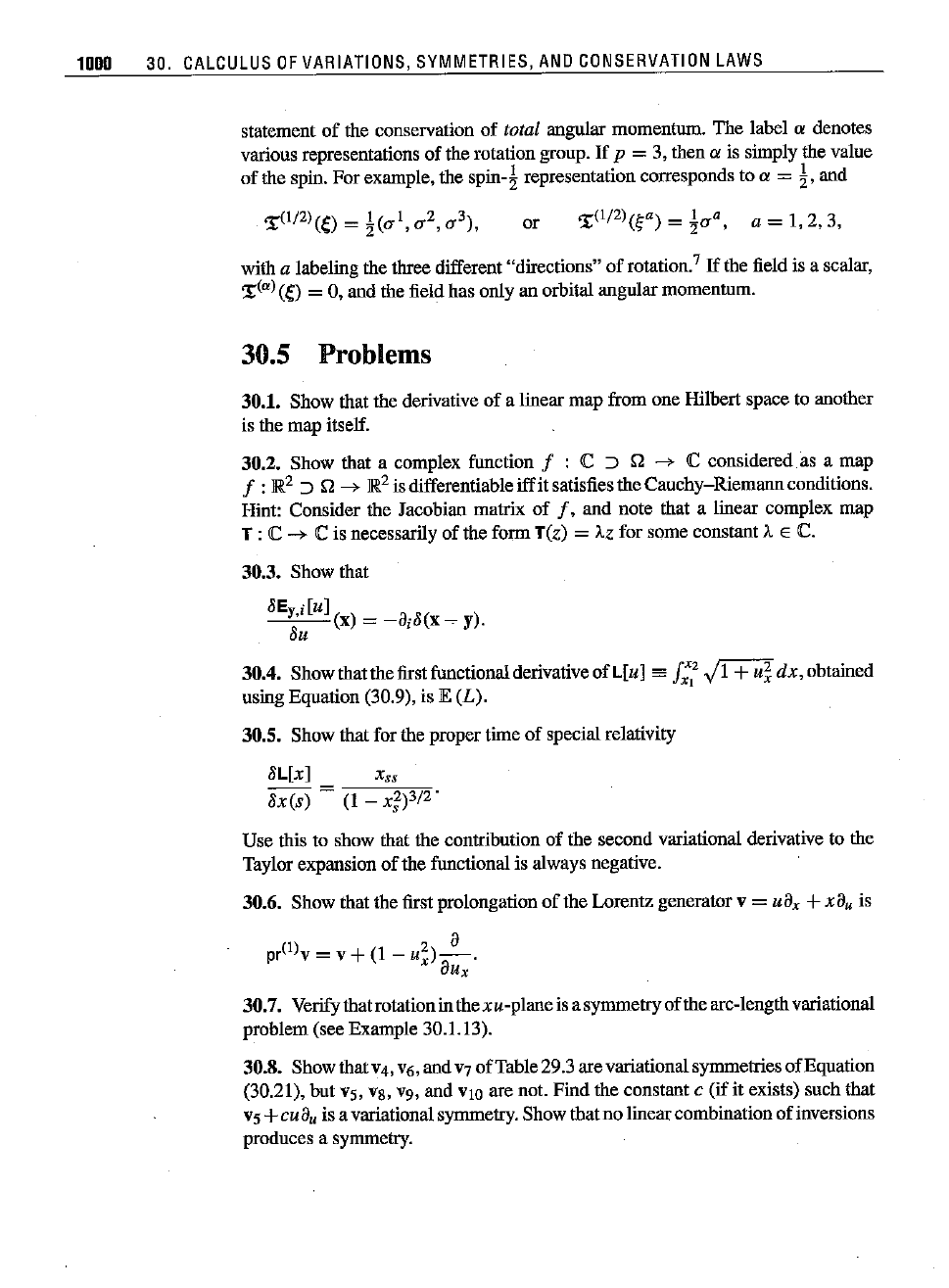
1000
30.
CALCULUS
OF
VARIATIONS, SYMMETRIES,
ANO
CONSERVATION
LAWS
statement
of
the conservation of total angular momentum. The label O! denotes
various representations of the rotation group.
If
p = 3, then O! is simply the value
of
the spin.
For
example, the
spin-~
representation corresponds to O! =
~,and
or
with
a labeling the three different "directions"
of
rotation?
If
the field is a scalar,
:rCa)
(e) = 0, and the field has only an orbital angnlar momentum.
30.5 Problems
30.1. Show that the derivative of a linear map from one Hilbert space to another
is the map itself.
30.2. Show that a complex function
f :
iC
::J g
--+
iC
considered as a map
f:]R2::J
g
--+
]R2is differentiable
iffit
satisfies the Cauchy-Riemannconditions.
Hint: Consider the Jacobian matrix of
f,
and note that a linear complex map
T :
iC
--+
iC
is necessarily of theform T(z) =
AZ
for some constant A E C.
30.3. Show that
8E
y
,i [U]
==:::'(x)
=
-ai8(X
- y).
8u
30.4. Showthat the firstfunctionalderivative of L[u]
'"
J~2
vi
1 +
ui
dx,
obtained
using Equation (30.9), is
JE
(L).
30.5. Show that for the proper time of special relativity
8L[x]
x"
8x(s) = (1 -
x})3/2'
Use this to show that the contribution of the second variational derivative to the
Taylor expansion
of
the functional is always negative.
30.6. Show that the first prolongation
of
the Lorentz generator v = ua
x
+xa
u
is
30.7. Verifythat rotationin the xu-planeis a symmetryofthe arc-lengthvariational
problem (see Example 30.1.13).
30.8. Show that
V4, V6,
and
V7
of
Table 29.3 are variationalsymmetries of Equation
(30.21), but vs, vg,
V9,
and
VlO
are not. Find the constant c
(if
it exists) such that
Vs
+cu
au
is a variational symmetry. Show that no linearcombinationof inversions
produces a symmetry.
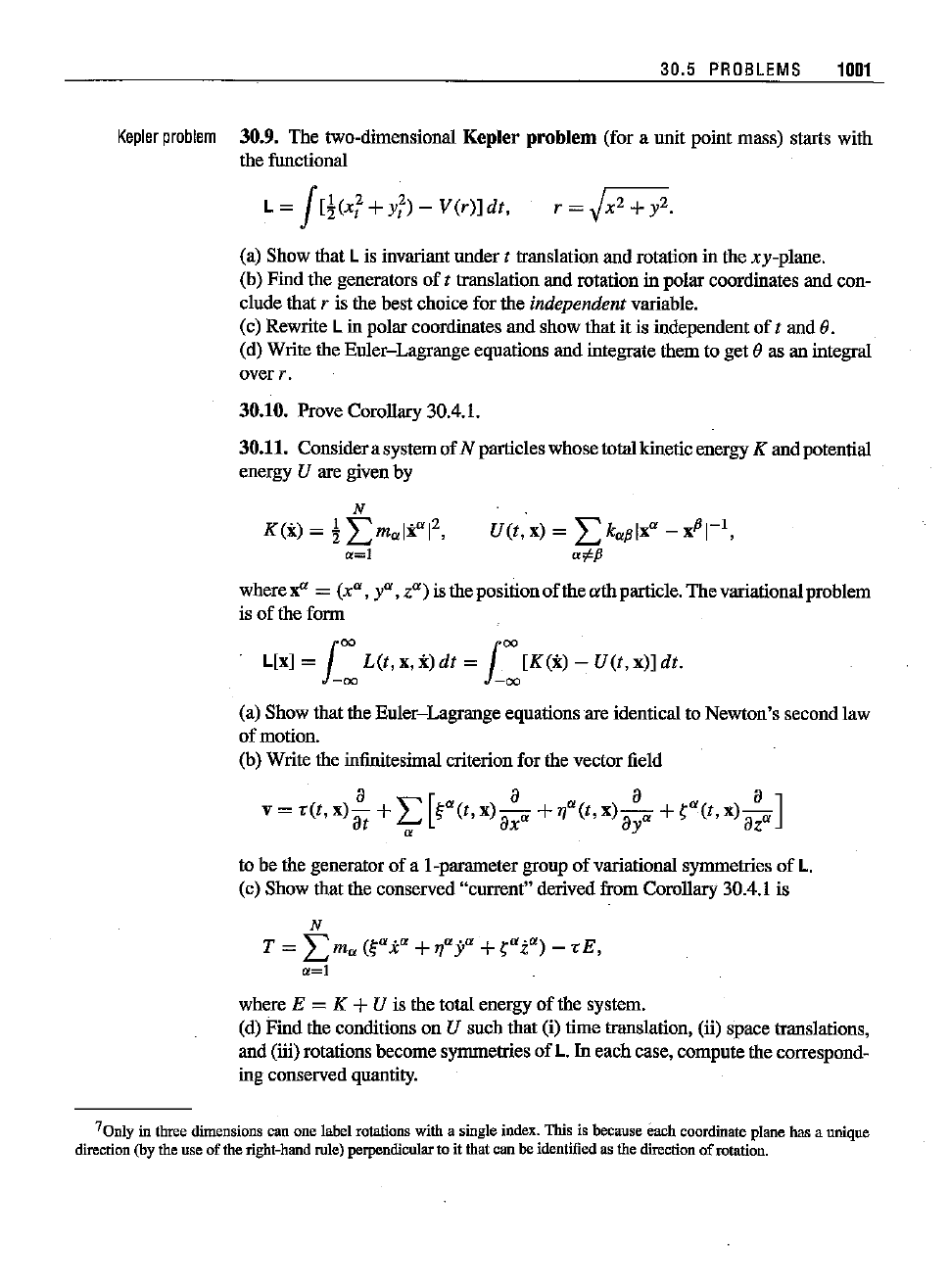
30.5
PROBLEMS
1001
Kepler
problem
30.9. The two-dimensional
Kepler
problem
(for a unit point mass) starts with
the functional
(a) Show that Lis invariant under
t translation and rotation in the xy-plane.
(b)
Find
the generators
of
t translation and rotation in polar coordinates and con-
clude that
r is the best choice for the independent variable.
(c) Rewrite Lin polar coordinates and show
that
it is independent
of
t and
e.
(d) Write the Euler-Lagrange equations and integrate them to get eas an integral
over
r.
30.10.
Prove Corollary 30.4.1.
30.11.
Considera system
of
N particleswhosetotalkineticenergy K and potential
energy
U are given by
N
K(x)
= !
L:m
a
l:i"1
2
,
a=l
U(t,x)
=
L:kapl~
_xPI-
1
,
a#
wherex" = (x
a,
s".
za) is the position
of
the
ath
particle.
The
variationalproblem
is
of
the form
L[x]
=
i:
ui.
x, x) dt =
i:
[K(x)
-
U(t,
x)]
dt.
(a) Show that the Euler-Lagrange equations are identical to Newton's secondlaw
of
motion.
(b) Write the infinitesimal criterion for the vector field
a
"[a
a a a a
a]
v =
,(t,
x)-
+
L..,
~
(t,
x)-a
+
~
(t,
x)---"
+
~
(t, x)----a
at
a
ax
ay
az
to be the generator
of
a I-parameter group
of
variational symmetries
of
L.
(c) Show that the conserved "current" derived from Corollary 30.4.1 is
N
T =
L:m
a
(~aia
+
~aya
+
~aia)
-
,E,
Cl=l
where E = K +U is the total energy
of
the system.
(d) Find the conditions on
U such that (i) time translation, (ii) space translations,
and (iii) rotations become symmetries
of
L.
In
eachcase, compute the correspond-
ing conserved quantity.
7Only in three dimensions can one label rotations with a single index. This is because eachcoordinate plane has a unique
direction (by the use
of
the right-hand rule) perpendicular to it that can be identified as the direction
of
rotation.
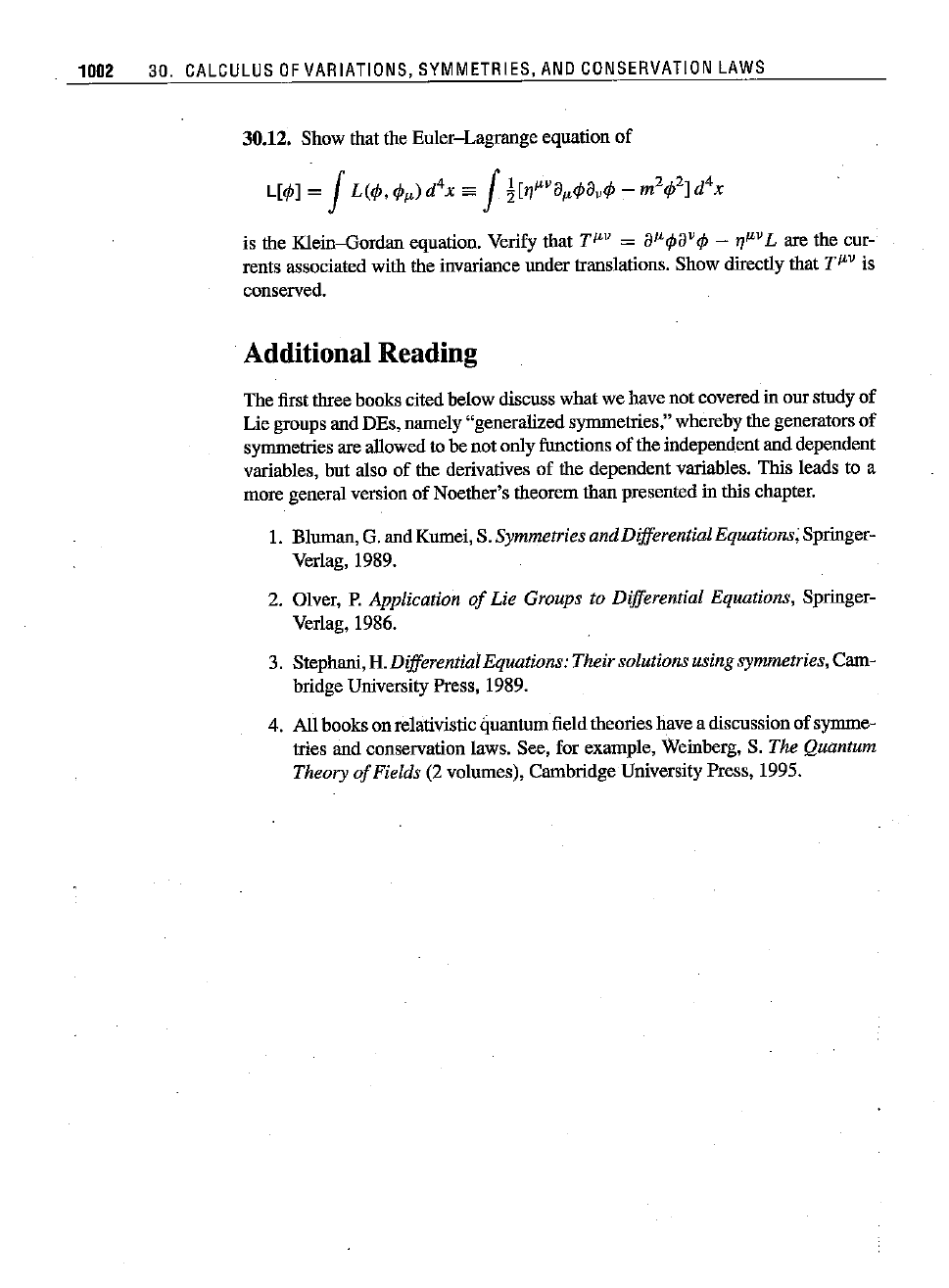
1002
30.
CALCULUS
OF
VARIATIONS, SYMMETRIES,
ANO
CONSERVATION
LAWS
30.12. Show that the Euler-Lagrange equatiun
of
is the
Klein-Gordan
equation. Verify that
TILv
= 8
IL</J8
v</J
-
~ILV
L are the cur-
rents associated with the invariance under translations. Show directly that
TILv is
conserved.
Additional Reading
The first three books cited below discuss
what
we have
not
coveredin our study
of
Lie groups and DEs,namely "generalizedsymmetries," whereby the generators
of
synuuetries are allowed to be
not
onlyfunctions
of
the independent
and
dependent
variables, but also
of
the derivatives
of
the dependent variables. This leads to a
more general version
of
Noether's theorem than presented in this chapter.
1. Blurnan,G. and Kurnei, S. Symmetries and DifferentialEquations; Springer-
Verlag, 1989.
2. Olver,
P.
Application
of
Lie Groups to Differential Equations, Springer-
Verlag, 1986.
3. Stephani,H.
DifferentialEquations: Theirsolutions using symmetries, Cam-
bridge University Press, 1989.
4. All books on relativistic quantumfield theories have a discussion
of
symme-
tries and conservation laws. See, for example, Weinberg, S.
The Quantum
Theory
of
Fields (2 volumes), Cambridge University Press, 1995.
